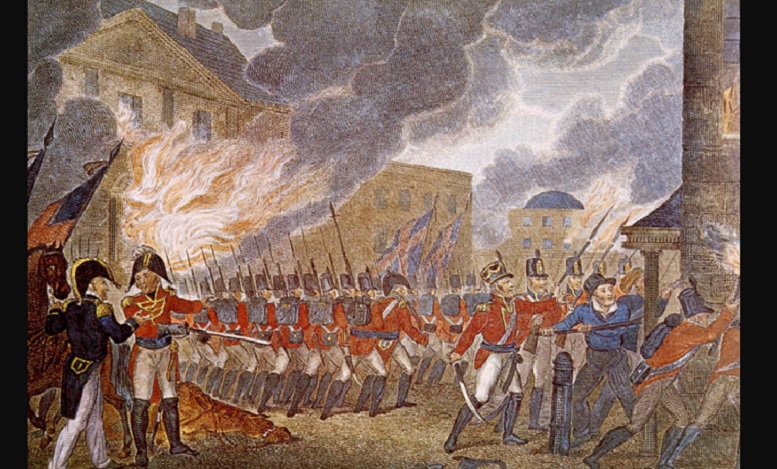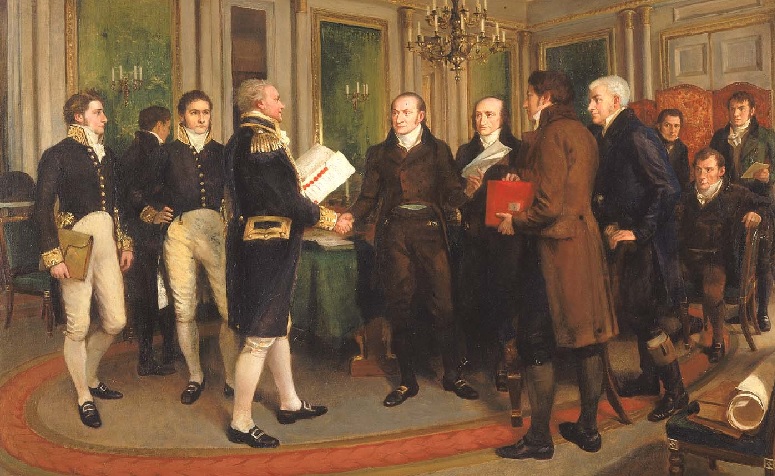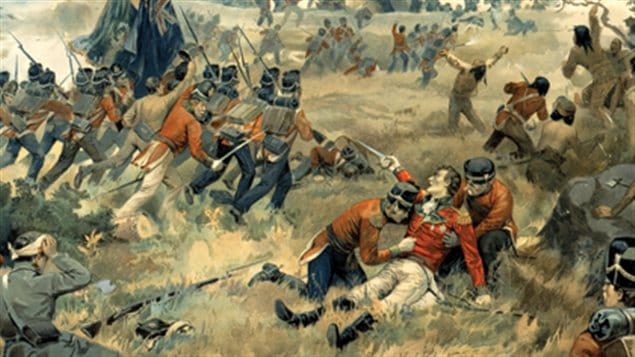It had been a long dragged-out conflict.
In Europe, Britain and France had been battling each other on and off since 1793.
By 1814, Britain had defeated Napoleon and France and could turn its attention and forces against the United States. The US had been drawn into the war as a third party over issues relating to trade with France and by British practice of “impressment” of sailors from American ships, and a desire to expand westward and take over ‘Indian’ lands. In their efforts to expand westward, the Americans had already fought and dispersed a confederacy of tribes at their base called Prophetstown Indiana in November 1811, blaming Britain for supporting the tribes with financial support and ammunition. Battles in the U.S against the indigenous tribes would continue for decades such as Gen Custer’s loss in Montana in 1876 as the Americans continued to occupy Indian lands westward.
War of 1812
As a result of these three main issues, the US declared war against Britain in June of 1812, and thought they could strike at Britain by occupying ‘Canada’, wrongly thinking that the colonists there were open to American ideals.
From then on, while the British colonies of Upper and Lower Canada had been successfully repelling US efforts to invade and conquer, neither British and ‘Canadian’ forces nor American forces had gained the upper hand. After a couple of years of expensive war, both were seeking peace, and the two sides met on neutral ground in Ghent. Although the British had defeated Napoleon in France in April of 1814, they feared his return (rightly so) and wanted to concentrate on the ‘European’ situation.

In retaliation for attacks and burning of ‘Canadian’ private property around Lake Erie, here British forces burn Washington D.C. in 1814 including damage to the “Presidential Mansion” later repainted to become the “White House”. (illustration is from the 1816 book, The History of England, from the Earliest Periods, Volume 1 by Paul M. Rapin de Thoyras. The source holder, of this book, is the U.S. Library of Congress-wiki commons).
Initially, the British thought they had the stronger position and terms included the US giving up vast territory including much of what is now, Michigan, Minnesota, Illinois, Indiana, Ohio, Missouri, Iowa, and Wisconsin. This was to create an independent “Indian” state, part of Britain’s promise to it’s aboriginal allies, and which they hoped would act as a buffer to further American expansion westward.
Britain also wanted to expand the borders of Canada to include the southern shores of the Great Lakes and much of the northern part of the US state of Maine which they had occupied in the final months of the war.
The American negotiators would have none of this and indeed at first insisted that Canada be handed over to them as a condition of peace.
The Treaty of Ghent
The talks dragged on. Meanwhile Britain was losing interest in the distant war which was also a costly drain on finances. The Americans were also very concerned as the war had virtually bankrupted the fledgling nation.

In this 1914 painting by A. Forestier, British Admiral Sir James Gambier and American John Quincy Adams shake hands after the signing of the treaty on December 24, 1814, while other negotiators and commission secretaries look on. As Britain was more concerned with negotiating terms with a defeated France, they has sent their “B” team to Ghent, while the Americans were more firm in their demands. (wiki commons)
Eventually both sides agreed to what was basically the status quo before the war. The Treaty of Ghent was signed on December 24, 1814 creating peace between the two nations.
However, before the news of the ending of hostilities reached them in the distant Americas, the British and Canadians briefly captured and burned Washington, while in another battle the British suffered a severe defeat at New Orleans.
The Americans learned of their victory at New Orleans and of the signing of peace at about the same time. This has lead to a long-standing impression that they had won the war. Canada meanwhile, considers it won the war, as it had repeatedly defeated and turned back American invasions, all ten invasion attempts, and thereby prevented absorption into the US, while Britain for its part, doesn’t really consider the North American war of 1812 much at all.
In the end, had the Americans agreed to the original terms it would have halted their desired western expansion into land occupied by aboriginals, and into the southwest occupied by Mexico. They would have lost some New England states to Canada and all of which may have resulted in a very different United States, a much stronger Canada with a straight line Canadian connection between the maritimes and central ‘Canada’ and a great shift in the course of history.
For Canada the Treaty of Ghent forced the Americans to recognize the Canada US border as a legitimate boundary (albeit still somewhat vague at the time). It ne
vertheless ensured that Canada would survive as a separate entity from the United States. It also was the first sense for Canadians that they were indeed a separate entity, not Americans, and although closely tied to Britain, not really British either, but “Canadian”. it had created cooperation. As for the boundary, the dispute over the northern border of Maine dragged on, close to violence in some cases, until the Webster-Ashburton treaty of 1842 which gave Maine much more of ‘its’ territory.
The Treaty of Ghent also was the first awakening sense for residents of the colonies to the north that they were indeed a separate entity, certainly not Americans, and although closely tied to Britain, not really entirely British either, but “Canadian”.
additional info-sources







For reasons beyond our control, and for an undetermined period of time, our comment section is now closed. However, our social networks remain open to your contributions.